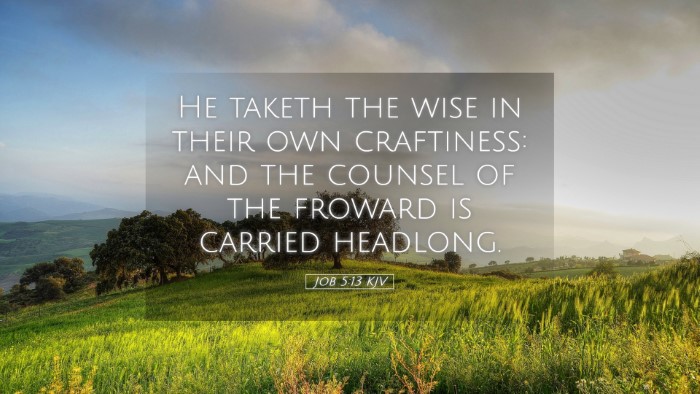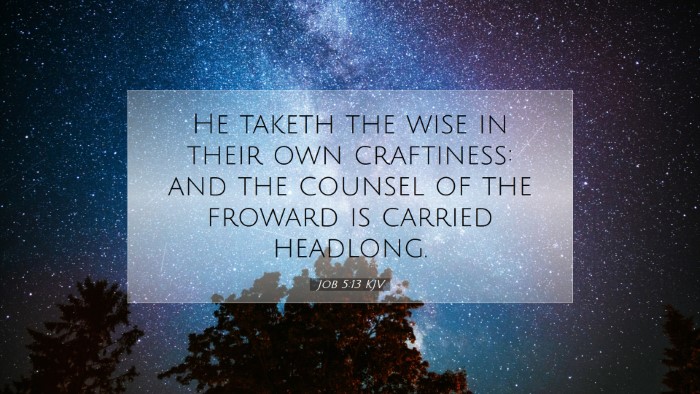Old Testament
Genesis Exodus Leviticus Numbers Deuteronomy Joshua Judges Ruth 1 Samuel 2 Samuel 1 Kings 2 Kings 1 Chronicles 2 Chronicles Ezra Nehemiah Esther Job Psalms Proverbs Ecclesiastes Song of Solomon Isaiah Jeremiah Lamentations Ezekiel Daniel Hosea Joel Amos Obadiah Jonah Micah Nahum Habakkuk Zephaniah Haggai Zechariah MalachiJob 5:13
Job 5:13 KJV
He taketh the wise in their own craftiness: and the counsel of the froward is carried headlong.
Job 5:13 Bible Commentary
Commentary on Job 5:13
Job 5:13 states, "He taketh the wise in their own craftiness: and the counsel of the froward is carried headlong." This verse is rich in theological and practical implications, drawing from various public domain commentaries.
Contextual Overview
The Book of Job addresses profound themes of suffering, divine sovereignty, and human wisdom. Chapter 5 continues the discourse of Eliphaz the Temanite, who speaks to Job concerning the nature of divine justice and the futility of human wisdom when it is not aligned with God's purposes.
Insights from Matthew Henry
Matthew Henry emphasizes the folly of those who trust in their own understanding apart from God. He notes that the wise, in their cleverness, often fall into traps of their own making. This aligns with Proverbs 14:12, which warns of the danger of a way that seems right but leads to destruction.
- Divine Irony: Henry posits that the very skills and understanding that humans pride themselves on can lead to their downfall. The wise may become ensnared by their own machinations.
- God’s Sovereignty: The verse highlights God's control over human decisions and the eventual consequences of those choices. God's ability to expose and thwart the plans of the wicked is paramount.
Albert Barnes' Perspective
Albert Barnes elaborates on the idea that the "craftiness" of the wise is nothing compared to God’s infinite wisdom. Barnes informs readers that God’s actions often turn the cunning plans of the froward against them.
- Judgment Against Whimsical Counsel: The "counsel of the froward" represents the intent and schemes of those who act contrary to God's will. Such thoughts may seem to prosper temporarily, but divine providence renders them futile.
- Ultimate Justice: Barnes stresses that this verse reassures the faithful that God will ultimately not allow the wicked to prosper in their wickedness, reinforcing the theme of hope for the righteous.
Adam Clarke's Analysis
Adam Clarke takes a more intricate approach to the Hebrew words used in Job 5:13. He relates this verse to the broader narrative of Job's struggle, suggesting that the counsel given by the froward lacks true insight and is often misguided.
- Historical Context: Clarke notes that the context of Job's trials is essential to understanding this verse. The plight of Job illustrates that while the wicked may seem to be successful, their ultimate fate is disastrous.
- Importance of Divine Revelation: According to Clarke, reliance on divine revelation and wisdom is vital. The verse acts as a reminder that seeking God’s counsel is superior to human reasoning.
Theological Implications
This verse serves as a powerful reminder about the nature of wisdom and human understanding versus divine wisdom. For pastors, scholars, and theologians, the implications are vast:
- Human Limitations: The limitations of human wisdom are showcased. Emphasizing reliance on God rather than human reason fosters deeper faith and trust in God's plans.
- Hope Amidst Trials: For those facing trials, Job 5:13 reassures that while troubles may be imminent, God’s wisdom and power remain unassailed. He will not allow the schemes of the wicked to go unpunished.
Practical Applications
This verse can be applied in various ministerial contexts, helping leaders guide their congregations toward a deeper understanding of God’s sovereignty:
- Encouragement for the Weary: Pastors can use this verse to encourage those who are struggling, affirming that God is aware of their plight and will act righteously.
- Reinforcing Faith Practices: Encourage congregations to seek God in times of doubt, reinforcing practices of prayer and reliance on Scripture for guidance over human counsel.
Conclusion
Job 5:13 stands as a profound witness to God’s sovereign oversight over human affairs. Biblical commentators such as Matthew Henry, Albert Barnes, and Adam Clarke collectively contribute to a nuanced understanding of this verse. They remind us of the fragility of human wisdom in the face of divine power and the eventual triumph of God's justice.


